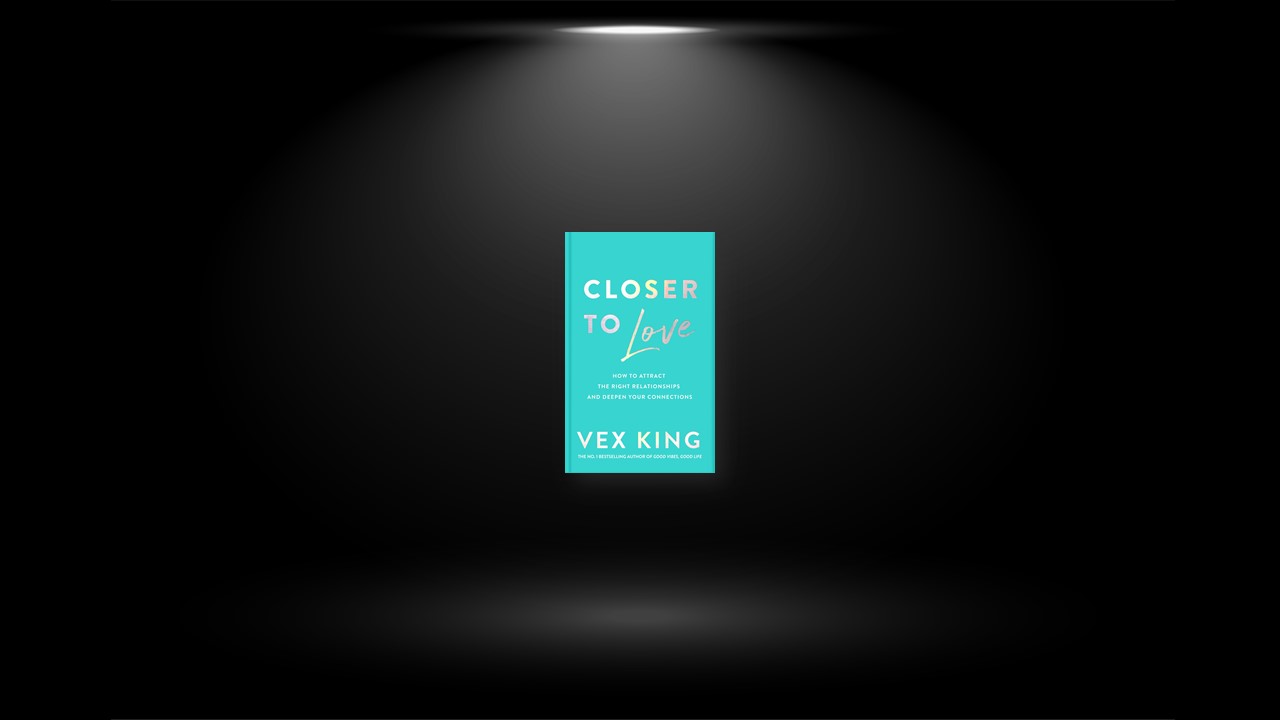Closer to Me, Closer to You
We learn a particular way to love from the moment we are born. When you ask yourself who you are and what you need, the answers may surprise you. Learning to unblock the ability to truly love is crucial. Self-awareness and self-knowledge allow you to love others completely.
Starting a relationship is like a journey in which you don’t always know the destination. Unblocking past pain and negative experiences can be done. Make space in your heart for yourself and your partner. Society’s common view of true love is a myth, but deep connection is a real possibility. By rediscovering your authentic self, you can nurture greater closeness with others.
Closed Heart, Open Heart
Letting go of the past is the key to achieving your future happiness. Hoarding your emotions leaves no space for positive, new ones. When you understand what your attachment style is, you can begin to detach from it and improve your relationships.
Your heart may be broken but it can heal again. Any new relationship can trigger old wounds if you aren’t grounded in your authentic self. Love is limitless when we learn how to overcome emotional barriers. Self-love creates space to love again, with an open heart.
Making Space
Recognizing the sanctity of your heart as a precious vessel is the first step to understanding your needs. Move from the headspace to the heart space to free yourself of past negativity and disappointments. The three spheres of love describe love as a pure energy, personal experience, and practice, and can bring a sense of wholeness.
Healing the heart takes time and self-wisdom. The cycle of grieving is an essential part of the healing process. Being able to overcome conflicts in a new relationship requires inner transformation first. Creating new neural pathways and establishing boundaries are key to making it work.
Decoding Attraction
You may not find the perfect relationship, but you can still achieve balance and fulfilment. Freedom is a double-edged sword if you don’t know how to use it correctly in any relationship. By learning more about the different kinds of attraction, you can better understand what your relationship is based on.
Instead of succumbing to the law of gravity and falling in love, you can rise in love. A spiritual connection can be stronger than any other kind of attraction. Decide which expectations are healthy and which are causing you to suffer. Emotional intelligence will allow you to connect on a deeper, more meaningful level.
Seven Relationship Rules
Rule One: Keep doing the little things
We all have a need for emotional connection, and this can be satisfied in the simplest of ways if we remain present in the relationship. You’ve probably all seen the couples in bars or restaurants who are glued to their phone instead of having a conversation together. What happened to their desire to be fully attentive to the other person, to look into their eyes, and hang on to their every word? As they say, two’s company and three’s a crowd, so don’t make your relationship a threesome (or foursome) with your mobiles!
When such drastic characteristics of the relationship change, the person experiencing less effort often feels like they’ve been baited and switched. But where love is mutual, effort will be matched. It’s no wonder one of the most common phrases for a marriage counsellor to hear is, ‘This isn’t the person I married,’ from a couple on the verge of collapse. Granted, we will all change, but the way in which you prioritize your relationship isn’t meant to.
It’s the simple things that make all the difference if you want to keep the magic in a relationship.
Rule Two: Disagree fairly
What starts out as a casual comment from one side might end up in nit-picking, screaming, and even tears, as both get into a cycle of ‘who said what’ over and over again. That can feel like reaching a dead end where you never see eye to eye on anything any more. If you begin from a place of genuine care and respect for your partner, you have to accept that there will be differences of opinion. Rather than becoming too overbearing or passive, there are ways to de-escalate conflict and solve the problem.
How about being your own referee, stopping the game when you see a foul? Or agree to disagree before it even gets there. No one likes dirty players, and even if you score a goal, what price does that come at? Follow the rules of fair play – whether you think you are right or not. Take a time-out to calm things down and regroup – that’s a lot better than letting things get out of control.
The more attuned you are to your emotions, the more you’ll be able to understand your reactions and why a conversation triggers an outburst. In any case, you always have the power to be compassionate and diffuse any situation.
Rule Three: Honour intimacy
When you can’t handle intimacy, it’s often easier to avoid it than to face it. But it can seriously affect your ability to commit, give, express, and enjoy physical contact. Intimacy comes from the Latin word intimus (‘inmost’, ‘deepest’), so real intimacy comes from both partners listening deeply to themselves first: to explore their hidden depths of emotions, desires, and vulnerability. When they are able to do so, they can reveal what they’ve discovered in an atmosphere of acceptance and intimacy which can be a catalyst for deep healing.
By talking through any concerns or fears, you will help your partner to understand where you are coming from. And when you listen to them, you will gain insights into their behaviour. In reality, intimacy does take time because it requires that an individual is brave enough to get to the bottom of their issues and then to open up about them, but it can be done in a nurturing, loving relationship.
By being open about intimacy and talking through it, you will be helping your partner to express their innermost feelings in a loving environment, which is all they really need at this point.
Rule Four: Do the dishes
It’s not the dishes that are causing the problem most of the time. They are simply the tip of the iceberg. When you don’t take your turn, pull your weight, or fail to carry out something you said you were going to do, it can be interpreted by your partner as not caring about them. They may believe that if they can’t rely on you to do a simple task, they won’t be able to depend on you when something more serious comes up.
Everything in life is about balance, and that means giving as well as taking. While you shouldn’t overextend in order to please your partner, it is possible to compromise and to reassure them that you really do respect their desires. Deal with the underlying issues rather than the surface reactions and gain a greater understanding of what your partner is experiencing. Instead of dismissing them as bothersome, try to read between the lines.
If you worry that you can’t depend on your partner, sit down with them and use the right words to convey that. Beginning sentences with, ‘I feel like you don’t respect me . . .’ can be much more constructive than accusations of, ‘You never do anything I ask . . .’ You can see the difference, right?
To make life easier, you can simply agree on a chore list and stick to it!
Rule Five: Have the hard talks
If you want to deepen your relationship with your partner, you have to be prepared to hang out the dirty linen. How else can you really get to know each other? You can only dance around each other’s flaws and/or incompatibilities for so long. It’s best to get real with one another right away, although it can be a painful process. Nevertheless, through it, you will both learn more about yourselves and come out of it with a stronger sense of love and understanding, and discover the processes required to meet each other in the middle.
You’ve got to do the hard work if you want to grow, and although it can be painful, there’s no other way around it. And you know, we often keep things inside for such a long time that the thought of actually uttering them out loud can be terrifying. The thing is, it’s often only when we manage to say what’s bothering us that we fully understand it.
When you engage in hard talk, you might be challenged by the other person to explain what you mean. This can be a very healing process, and although it sounds scary, you won’t regret it. As long as you feel that you will be heard with compassion and love, I think you should go for it!
Rule Six: Never compare
First of all, no two people are alike, so setting your past experience with someone as a yardstick by which everyone else will be judged is just wrong. Secondly, whatever went on with you in the past should stay in the past. You might have learned some lessons, but if these prevent you from moving forward, it’s going to be hard to make any new relationship work.
Comparisons are also a bit selfish because you are thinking about what your partner should do for you, rather than what you should be doing for them. Instead of dwelling on what’s missing, focus on all the great aspects of your relationship and work on expanding those. Otherwise, you need to consider why you are in the relationship at all.
Rule Seven: Have a plan
Knowing what possible obstacles you might come up against and how to avoid them isn’t a bad thing – it gives you greater ability to handle them when they arise. You wouldn’t walk blindly into a minefield, so why would you do that in a relationship?
It’s a good idea to agree on some very important ground rules before you let destiny take its unpredictable course, such as: What do you both want from the relationship? Are you after a casual, friends-with-benefits kind of thing, or looking for a serious commitment? Do you like the idea of a one-on-one connection, or have other preferences such as polyamory? What is non-negotiable for you? Are honesty, respect, and communication a must or are you OK with your partner lacking these qualities? How flexible are you when it comes to lifestyles, opinions, preferences? Can you overlook anything that you don’t agree with? What does your heart want?


